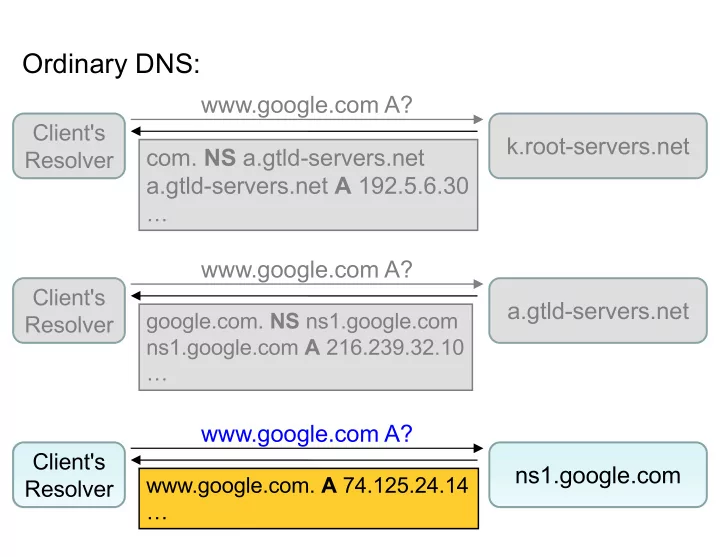

Ordinary DNS: www.google.com A? Client's k.root-servers.net com. NS a.gtld-servers.net Resolver a.gtld-servers.net A 192.5.6.30 … www.google.com A? Client's a.gtld-servers.net google.com. NS ns1.google.com Resolver ns1.google.com A 216.239.32.10 … www.google.com A? Client's ns1.google.com www.google.com. A 74.125.24.14 Resolver …
DNSSEC (with simplifications): www.google.com A? DO Client's k.root-servers.net com. NS a.gtld-servers.net Resolver a.gtld-servers.net. A 192.5.6.30 … com. DS description-of-com's-key com. RRSIG DS signature-of-that- DS -record-using-root's-key Delegation Signer identifies .com 's public key (name and hash)
DNSSEC (with simplifications): www.google.com A? DO Client's k.root-servers.net com. NS a.gtld-servers.net Resolver a.gtld-servers.net. A 192.5.6.30 … com. DS description-of-com's-key com. RRSIG DS signature-of-that- DS -record-using-root's-key Retrieving .com 's public key is complicated (actually involves multiple keys) …
DNSSEC (with simplifications): www.google.com A? DO Client's k.root-servers.net com. NS a.gtld-servers.net Resolver a.gtld-servers.net. A 192.5.6.30 … com. DS description-of-com's-key com. RRSIG DS signature-of-that- DS -record-using-root's-key RRSIG specifies signature over another RR … here, the above DS record
DNSSEC (with simplifications): www.google.com A? DO Client's k.root-servers.net com. NS a.gtld-servers.net Resolver a.gtld-servers.net. A 192.5.6.30 … com. DS description-of-com's-key com. RRSIG DS signature-of-that- DS -record-using-root's-key Note: no signature over NS or A !
DNSSEC (with simplifications): www.google.com A? DO Client's a.gtld-servers.net google.com. NS ns1.google.com Resolver ns1.google.com. A 216.239.32.10 … google.com. DS description-of- google.com's-key google.com. RRSIG DS signature- of-that- DS -record-using-com's-key
DNSSEC (with simplifications): www.google.com A? DO Client's ns1.google.com www.google.com. A 74.125.24.14 Resolver … www.google.com. RRSIG A signature-of-the- A -records-using- google.com's-key
DNSSEC - Mallory attacks! www.google.com A? DO Client's ns1.evil.com www.google.com. A 6.6.6.6 Resolver Resolver observes that the reply didn't include a signature, rejects it as insecure
DNSSEC - Mallory attacks! www.google.com A? DO Client's ns1.evil.com www.google.com. A 6.6.6.6 Resolver www.google.com RRSIG A signature-of-the- A -record-using- evil.com's-key (1) If resolver didn't receive a signature from .com for evil.com 's key, then it can't validate this signature & ignores reply since it's not properly signed …
DNSSEC - Mallory attacks! www.google.com A? DO Client's ns1.evil.com www.google.com. A 6.6.6.6 Resolver www.google.com RRSIG A signature-of-the- A -record-using- evil.com's-key (2) If resolver did receive a signature from .com for evil.com 's key, then it knows the key is for evil.com and not google.com … and ignores it
DNSSEC - Mallory attacks! www.google.com A? DO Client's ns1.evil.com www.google.com. A 6.6.6.6 Resolver www.google.com RRSIG A signature-of-the- A -record-using- google.com's-key If signature actually comes from google.com 's key, resolver will believe it … … but no such signature should exist unless either: (1) google.com 's private key was compromised, or (2) google.com intended to sign the RR
69-byte query
3419-byte reply
Recommend
More recommend